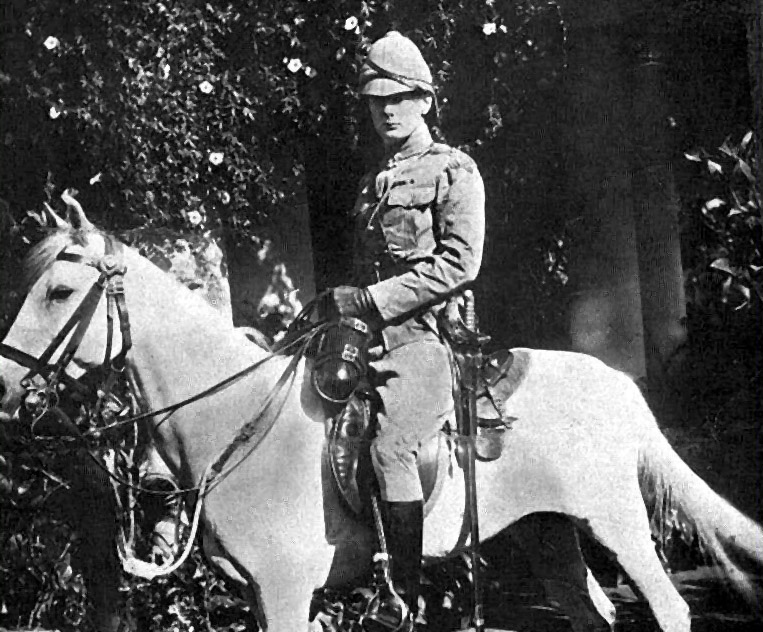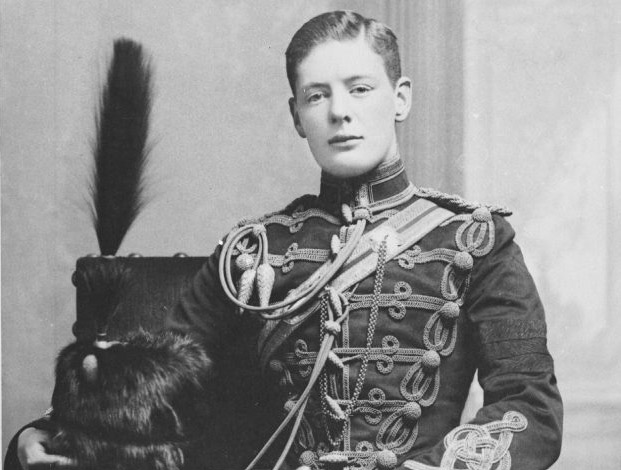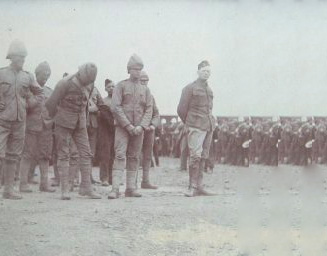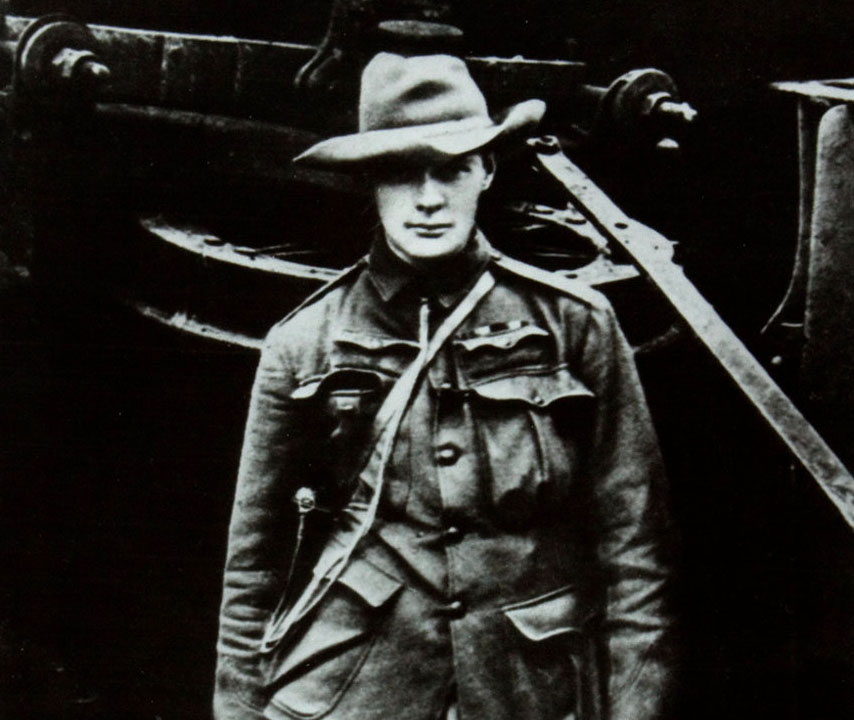Young Soldier

Winston Churchill as a young solider. Winston served in the British army from 1895 to 1898.
The death of Lord Randolph Churchill on 24 January 1895, aged just forty-five, and before Churchill had been able to prove himself to his father, clearly had a profound effect. Churchill became a cavalry officer in the 4th Queen’s Own Hussars only a month later but almost from the beginning his mind was set on following his father into politics. To do this he needed fame and fortune.
In the five years between 1895 and 1900, he sought them both by getting himself transferred to as many dangerous places as possible and then writing up his experiences as newspaper articles and books. He was shot at in Cuba, fought in what is now Pakistan, on the Afghan border, survived a cavalry charge in the Sudan, and made the headlines by escaping from Boer captivity in South Africa.
This section tells you how the young Churchill launched himself on the world.
Winston spent the term with Captain James preparing for his third attempt to get into Sandhurst. As always, mathematics was a struggle for him. ‘I am assured [that mathematical skills] are most helpful in engineering, astronomy and things like that,’ he wrote, ‘…and I am glad there are quite a number of people born with a gift and a liking for all this.’ He was not one of those people.
Read MoreWhile playing hare and hounds, Winston experienced another miracle in his life: he survived an attempt to leap from a bridge to the top of a fir tree, but the twenty-nine foot fall ruptured his kidney. The Times grossly understated the extent of the injury when it reported that “he was very much shaken and bruised.” His parents spared no expense in providing the best medical care but he was six weeks in recovery and should have been longer.
Success and failure at school:
Winston was jubilant that, after three attempts, he had passed into the Royal Military College at Sandhurst. Although he had achieved a standard which admitted him to the cavalry and not to his father’s desired infantry regiment, he wrote what his own son later called ‘a somewhat insouciant letter to Lord Randolph.’ He received ‘one of the most formidable rebukes of Lord Randolph that survive.’
Sandhurst Victories: Winston entered the Royal Military College at Sandhurst as a cavalry cadet because he had not qualified for the infantry, a circumstance of great disappointment to his father. He would soon be granted an opening in the infantry, but shortly after he entered school he was invited to attend a mess of the Fourth Queen’s Own Hussars, a light cavalry regiment.
Read moreIt was intended that Winston would join the 60th Rifles Infantry Regiment upon graduation from Sandhurst but his fervent desire to join the cavalry was expressed in a letter to his mother: ‘Promotions much quicker in Cavalry; Obtain your commission in Cav much sooner, 4th Hussars are going to India shortly.

Churchill did well at Sandhurst, graduating twentieth out of a class of 130 in December 1894. As he later wrote, “It shows that I could learn quickly the things that matter.” For the first time in his life his personal interests and his work were the same and he excelled. A distinguished career had begun.
Churchill received his commission from Queen Victoria with an effective date of February 20th, 1895.
Lord and Lady Randolph embark on an ill-advised world tour
Read moreTower Bridge opens in London
Commissioned as a first lieutenant in Queen’s Own 4th Hussars
Churchill remembered his years at Sandhurst, from which he ‘retired’ with a commission in the 4th Hussars, as ‘hard but happy.’ He felt that he had demonstrated that he ‘could learn quickly enough the things that mattered.’
Read moreWinston rushes to the bedside of his beloved Mrs Everest
Read moreYoung Winston makes his first political speech
Read moreChurchill makes his first of many visits to US
On his first visit to the US, he is introduced to Bourke Cockran who was to become a mentor, teaching him the art of public speaking
Read moreLater in life Churchill reflected on his years in the 4th Hussars. He recalled that the young officers envied the decorations and experiences of their senior colleagues and wondered whether their own chance to win glory would ever come
Read moreReturns from Cuba for a six month stay in England
Read moreWinston later called this period ‘among the most agreeable six months I have ever spent.’ He had just come through a particularly trying situation in which he successfully sued and received an apology from a father of a fellow cadet who resented Churchill’s role in an unseemly attempt to exclude the cadet from the 4th Hussars as ‘unsuitable.’
Read moreChurchill prepared to embark on India with the 4th Hussars he found his future ‘utterly unattractive. I look upon going to India as useless and unprofitable exile. I feel that I am guilty of an indolent folly that I shall regret all my life.’ To his mother he wrote, ‘It is useless to preach the gospel of patience to me. Others as young are making the running now and what chance have I of ever catching up.’
Churchill’s regiment, the 4th Hussars, arrived at Bombay Harbour and then travelled by train to Bangalore in southern India. In My Early Life, he wrote, “If you like to be waited on and relieved of home worries, India thirty years ago was perfection. All you had to do was to hand over all your uniform and clothes to the dressing boy, your ponies to the syce, and your money to the butler, and you need never trouble any more…’
Read moreChurchill always regretted that he did not have a university education but he covered this disappointment with his famous wit. He once noted that he had received many more degrees than he had passed examinations. Nevertheless, he was extremely well-read. That process began while he was in India, a period which he called ‘the university of my life.’
Read moreMay marked the end of Churchill’s almost superhuman effort to educate himself by reading yards of classic literature and studying the Annual Register for all years since his birth. Now his search for fame and action demanding his return from India. Though Lady Randolph resisted this on grounds of cost, and feared he would get a reputation for not sticking to anything, Churchill wanted action.
Read moreOn 26 July Churchill made his maiden political speech. He was pleased with the press reports on his efforts.
Read moreJoins the Malakand Field Force commanded by Sir Bindon Blood
Winston thought that his brother Jack would follow him into the Army but his mother knew that he would not pass the medical examination because of his eyesight, and she could not provide him with the necessary allowance.
Read moreChurchill departs for Egypt and fights in the Battle of Omdurman in Sudan
Read moreThe Nile War over, Churchill returned to England where he immediately became embroiled in controversy over his military and political activities. The Prince of Wales wrote him that ‘I think an officer serving in a campaign should not write letters for the newspapers or express strong opinions of how the operations are carried out.’
Read moreEarly in December 1898, Churchill returned to India to play in the annual Inter-Regimental Polo Tournament. On board ship, he worked on his manuscript for the River War, writing his mother on 11 December: ‘I have however made good progress with the book. Three vy long chapters are now almost entirely completed. The chapter describing the fall of Khartoum Gordon’s death etc is I think quite the most lofty passage I have ever written.’
Read moreResigns from army to pursue a political career
In late March 1899, on his way home from Egypt, Churchill wrote to his grandmother explaining his decision to leave the Army for a writing career: ‘Had the army been a source of income to me instead of a channel of expenditure I might have felt compelled to stick to it. But I can live cheaper & earn more as a writer, special correspondent or journalist; and this work is moreover more congenial and more likely to assist me in pursuing the larger ends of life.’
Churchill spent the summer of 1899 in his first parliamentary election campaign, attempting, unsuccessfully, to persuade Pamela Plowden to join him.
Read moreSails to South Africa as war correspondent
Publishes The River War

Captured by the Boers in South Africa
Escapes from prison in Pretoria
Read more
Churchill during the Boer War while writing for the Morning Post in 1899
Autumn 1899 began with Churchill the war correspondent travelling by ship to South Africa to report on the Anglo-Boer War. It ended with Churchill the escaped prisoner travelling by train surreptitiously out of South Africa into Portuguese East Africa. In between these two journeys, Churchill became famous throughout the world.
Read moreChurchill spent Christmas Eve at the headquarters of General Redvers Buller, scarcely a few hundred yards from where he had been captured by the Boers 36 days earlier. During January, General Buller gave Churchill a commission as a lieutenant in the South African Light Horse despite the fact that he continued to serve as a war correspondent for The Morning Post.
Spring 1900 found Churchill very much engaged in the war against the Boers, heedlessly taking chances with his life on occasions where only his death would have afforded him any publicity. On one occasion, in April 1900, Churchill, as a correspondent, joined a cavalry attempt to capture a small hill, racing a group of Boer horsemen to the summit.
Read moreChurchill returned home on 20 July 1900 on the Dunottar Castle, the same ship on which he had arrived in South Africa eight months earlier. On the very next day he began inscribing copies of his latest book, London to Ladysmith via Pretoria, beginning with an inscription to Oliver Borthwick, The Morning Post editor who had sent him there (see Finest Hour 105, p. 45). An election was in the offing so Churchill next set out for Oldham, for his second try at elective office.
Enters Pretoria with British troops
Publishes Ian Hamilton’s March
Money, or his lack of it, was very much on Churchill’s mind after his election to Parliament for Oldham on 2 October. Thereafter, he toured the country during the remainder of the three-week polling period speaking on behalf of many Conservative candidates, including Balfour and Chamberlain.
Read moreLecture tour of North America begins
Lecture in Philadelphia
Churchill earns more than any contemporary journalist
In his lifetime, Churchill published more than 40 books in 60 volumes.
View his writingWorking to celebrate the life and achievements of a great leader.
Young ChurchilliansIn his lifetime, Churchill published more than 40 books in 60 volumes.
View PublicationsGet the Churchill Bulletin delivered to your inbox once a month.